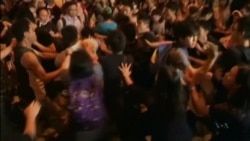White House officials say they are monitoring student-led protests in Hong Kong closely after China this week warned of unimaginable consequences that could include using force to put down the demonstrations.
The demonstrations show no signs of letting up, presenting a dilemma for China's communist leaders who are deciding between cracking down on the protesters and facing international condemnation or risking seeing the pro-democracy fervor spread to the mainland.
The White House is watching closely.
Spokesman Josh Earnest called on China to respect its obligations under a basic law that guarantees Hong Kong’s citizens democratic rights under the principle of one country with two systems.
“We have been very consistent in voicing our support to the People’s Republic of China for universal suffrage and for the aspirations of the Hong Kong people, and we’re going to continue to do so," he said.
Analysts say U.S. warnings are not likely to sway China to negotiate with or, much less, give in to the demands of the demonstrators. Beijing hopes these demonstrators will get tired, and the protests will dissipate on their own.
Abraham Denmark, with the National Bureau of Asian Research, said seeing the protests escalate is not in the interest of either Beijing or Washington.
“This would be problematic for the United States and it would also be very problematic for China because their relationship is very important for their own economic development," said Denmark. "They understand this so they’re going to try to seek to avoid some sort of problem in our bilateral relationship as well.”
In 1989, when China’s communist leaders cracked down on demonstrators at Beijing’s Tiananmen Square, the United States imposed an arms embargo that remains to this day but took no stronger action. Analysts say Washington's response this time likely would not be any tougher.
Gordon Chang, author of the book The Coming Collapse of China, spoke to VOA via Skype.
“I think Beijing will not take what Washington says into account for a couple of reasons. First of all, they see what’s going on in Hong Kong as an existential threat to the Communist Party, and also they don’t believe that we’re serious. So, you put those two things together and Beijing will ignore us.”
For now, the Hong Kong demonstrations are low on the list of priorities for U.S. officials who are juggling crises involving the Middle East and Ebola. Analysts say that could change quickly if China uses force to crush the demonstrations.















